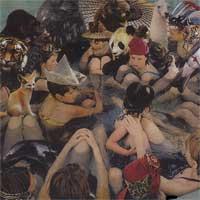Noah Lennox has a storied musical history. He released his first album under the Panda Bear moniker as a teenager in Baltimore. He was longtime friends with a guy named Josh Dibb, who helped him release some of his music. Noah went away to Pennsylvania for a while as his friend Josh started a band called Automine with two other college students: David Portner and Brian Weitz. After much moving around, the four of them wound up living in New York by 2000. Portner asked Lennox to play drums on the album he was working on under his solo, alter-ego name. The album was called Spirit They've Gone, Spirit They've Vanished. Eventually all four musicians would become known by their made-up names (Avey Tare, Deakin, Geologist, and Panda Bear) when they formed Animal Collective -- their most successful band to date.
Despite writing much music together in Animal Collective, Noah still had the itch to record more solo material. He released a second album as Panda Bear, called Young Prayer. It was a very divisive record, as it was somber low-key indie folk. It came after the death of Lennox's father and was recorded in his father's old house. It sounded like Animal Collective, but with the pop and energy removed. Where the strong melodic sense of Animal Collective is one of the band's key selling points, Panda Bear opted for ethereal, mood-based music.
After another Animal Collective record (2005's excellent Feels) and moving his wife and daughter to Lisbon, Portugal, Panda Bear has returned with a total departure from his previous sound with Person Pitch. Loose, rythmic guitar strums and ambient tones have been traded for tight polyrhythms, samples, loops, and commanding, melodic vocals.
The album opens with what sounds like a cheap carnival roller coaster being cranked up the initial slope. The album that ensues, however, is less like the gut-churning dive of the first drop, and more like the roller coaster got to the top and you were suddenly floating in the Bahamas. This is the soundtrack to taking it easy. I found a smile creep across my face as Lennox sang on the first track: "Coolness is having courage / Courage to do what's right / I'll try to remember always / Just to have a good time."
The Brian Wilson / Beach Boys influence is extremely apparent, but certainly isn't derivative. The use of loops, not-from-this-planet sound effects, and heavy reverb keep this album extremely fresh. The real one-up on previous Panda Bear recordings is the incredible sense of melody on each track. Every song -- even the foggy dawn haze of "I'm Not" and the ambient loop-based "Search for Delicious" -- has an instantly memorable hook that you'll have stuck in your head until you hear the next hook. It's an altogether sublime experience.
One doesn't really grasp how epic the album is, however, until the third track "Bros," a 12+-minute jungle beach party in heaven. It is only surpassed in greatness by the other 12+-minute track on the album, "Good Girl / Carrots." Instead of the feel-good acoustic strum and heavily multi-tracked harmonies of the first, "Good Girl / Carrots" is an entrancing foray into tribal drums and echo-disguised vocals. Halfway through, the song becomes a rhythmic saloon piano stomper. Lennox sings to some unknown hater, "All I want to do is take it easy / It's not a ticket / For you to pick at / Other people / Who don't know what's up like you're so sure you do." The lyrics are almost entirely like this, heavily influenced by the rules of Brian Wilson Songwriting 101: make a simple statement, sing it nice, have said simple statement now become profound because of how laid back you are.
The album ends with Lennox singing in three-part harmonies over a chimey organ that sounds like it's underwater. One can imagine the sun setting behind palm trees as Lennox falls asleep on the beach. Ultimately, the imagery one associates with these songs become the most important aspect of the album. At least for me, as the mercilessly cold Philadelphia winter begins to give way to the irrevocably pleasant spring time, this album helps to serve as the transition. It's a prelude of things to come.
